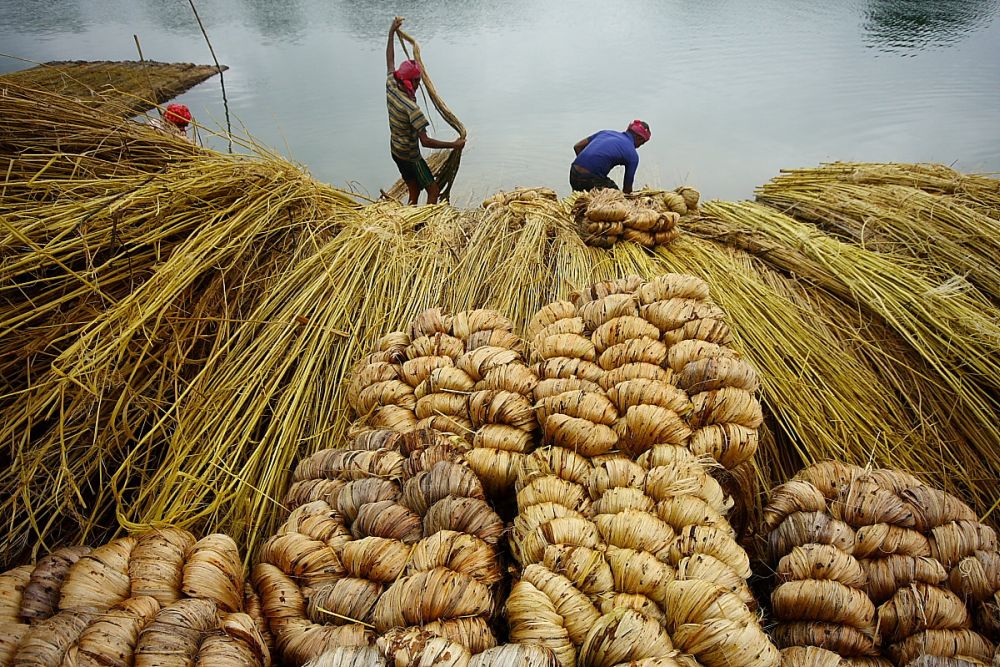
By Dr. Jaijit Bhattacharya
What is the point of having regulations if they are never to be enforced? The question has assumed significance since some four million jute growers are staring at an existential crisis brought about by declining demand made worse by the flagrant violation of government rules by an important and influential sector of the Indian industry.
Though considered a golden fibre, jute in recent months has lost much of its lustre with jute mills massively cutting down on production. It has meant that growers of jute are saddled with produce that millers are refusing to buy, pushing them into penury. A few million more who are associated with the jute industry in various capacities – from traders to transporters – have also been badly hit. With mills reluctant to procure raw jute, incomes have vanished and livelihoods for tens of thousands have been badly compromised.
But why have things come to such a pass?
The reasons could have seemed comical had the consequences not been this grave. But to cut a long story short, one major reason behind the current crisis is the persistent and blatant violation of the Jute Packaging Materials (JPM) Act by India’s sugar industry.
To begin with, the JPM Act enacted in 1987 mandated compulsory use of jute sacks manufactured by Indian jute mills for the packaging of products by other Indian industries. For example, it mandated that 100 percent of foodgrains and sugar produced in India be packaged in jute sacks. As the years rolled by, some products such as fertilisers and cement fell off that list. The percentages too for mandatory packaging also changed over time. The percentage for food grains fluctuated up and down and is now back again at 100%. In the case of sugar, it is now 20%.
It has been 10 years since the sugar industry is mandated to compulsorily package 20% of its produce in jute sacks. And since 2014, the office of the jute commissioner – the government authority overseeing the entire supply chain of the jute industry – has been issuing notifications every year for the sugar industry to comply. Since the notifications invoke the JPM Act, any violation should attract penal measures – both seizure of goods and monetary penalties.
Strangely though, the sugar industry does not comply. For that matter, it has never complied, preferring to use cheaper plastics for the purpose of packaging. And for some unknown reasons, the authorities too have not cracked down on the sugar industry. Though the sugar industry has consistently violated the provision, they have strangely never ever been penalised yet.
The sugar industry’s non-compliance is proving an extremely bitter burden for the farmers and workers associated with jute. They are literally drowning in distress triggered by a combination of factors.
Until recently, Indian jute mills mostly concentrated in eastern India were struggling to meet the demand for jute sacks that the Government of India procured for packaging foodgrains. In anticipation that the demand for jute sacks to package food grains would remain high, the mills made fresh investments and increased their capacity to 40 lakh bales. But to their dismay, the demand this year has drastically fallen.
In the wake of the Russia-Ukraine war, wheat prices have shot up, overtaking the MSP fixed by the government. Wheat farmers consequently are selling more to private traders than the government. It has meant that though the government is procuring and packaging foodgrains, the procurement is not as high as last year and much of the increased production capacity of the jute mills is lying idle. The mills are manufacturing less jute sacks since the government would not buy as many as in the previous year.
The need for a lesser number of jute sacks this year has set off a chain of unhappy consequences. Mills are reluctant to buy raw jute and jute farmers are struggling to find buyers for their jute. It has pushed down prices and farmers are resorting to distress sale.
The upshot is a deep disquiet that has descended on India’s jute belt. Farmers, for that matter, have taken to the streets in many parts of West Bengal, blocking traffic and raising angry slogans. Tempers are running high, including in Hooghly district’s Singur – more notorious otherwise for Tata group’s aborted attempt to set up its Nano automobile factory in the face of political protests.
The plummeting price for jute is the cause of latest upheaval with farmers such Sumanta Majhi insisting that they are doomed.
A marginal farmer with no more than six acres on which he spent some Rs 30,000 to grow jute, he has managed to recover only about 50 percent of his investment by selling his produce virtually at a throwaway price. “I had no choice. I need to feed mouths at home after all,” Majhi lamented. The mood is equally grim at most mills as well. The machines there are all whirring, but work days have been cut down and workers are being encouraged not to report for work every day.
Unmindful of the snowballing anguish, the sugar industry is continuing to use plastic for packaging. In doing so, it is overlooking the harm that plastic does in contrast to jute that is environmentally friendly and biodegradable. But plastic is being preferred as it is cheaper than jute.
The fact, however, is that jute sacks work out cheaper in the long run as they can be reused at least six times. Sadly though, none is looking long term, fixated on immediate gains allowed by a JPM Act that is lying dormant. It is only the jute farmers who are spending sleepless nights.
This article first appeared in ET Government, https://government.economictimes.indiatimes.com/blog/why-sugar-industry-violations-are-very-bitter-for-jute-farmers/104964444